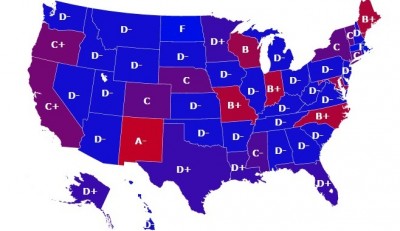The majority of states in the US received a grade of “D” or worse in the second edition of the Institute for Justice’s Policing For Profit report, which examined how law enforcement can seize property or money and not return it, even if the person is never charged or found guilty.
“Civil forfeiture laws pose some of the greatest threats to property rights in the nation today, too often making it easy and lucrative for law enforcement to take and keep property—regardless of the owner’s guilt or innocence,” the Institute’s research team wrote in the report’s introduction.
The report graded the civil forfeiture laws of each state, as well as the federal government, documenting the “remarkable growth in forfeiture activity across the country” and highlighting a “worrisome lack of transparency surrounding forfeiture activity and expenditures from forfeiture funds.”
“Every year, police and prosecutors across the United States take hundreds of millions of dollars in cash, cars, homes and other property—regardless of the owners’ guilt or innocence,” the report said. “Under civil forfeiture laws, the government can seize this property on the mere suspicion that it is connected to criminal activity. No charges or convictions are required.”
Discover The ONLY Way Back To True Freedom And Liberty In America…
Often, police departments pocket the money to purchase new equipment.
“Once property is seized, owners must navigate a confusing, complex and often expensive legal process to try to win it back,” the report says. “Worst of all, most civil forfeiture laws give law enforcement agencies a powerful incentive to take property: a cut, or even all, of forfeiture proceeds.”
Some of its disturbing highlights include:
- The amount of civil forfeiture in the United States increased by 4,667 percent between 1986 and 2014. In 1987, the US Department of Justice’s (DOJ) Civil Forfeiture Fund took in $93.7 million and by 2014 it was raking in $4.5 billion.
- Federal forfeiture revenues grew by 1,000 percent between 2001 and 2014. In that period DOJ and the US Treasury collected $29 billion in forfeiture money.
- Around 88 percent of the civil forfeitures conducted by the DOJ took place administratively, which means that no court hearing was held and no lawyers were involved. The government simply took money and property, and the person either didn’t have the resources to challenge it or chose not to do so.
- Federal civil forfeiture laws are among the nation’s worst. The Institute gave Uncle Sam a D-.
- Between 2000 and 2013, the amount of forfeiture money DOJ shared with state and local law enforcement tripled, rising from $198 million to $643 million a year.
New Mexico received an A-, and only four states – Maine, Missouri, Indiana and North Carolina – got a B+. The majority of the states received variations of Ds or an F.
What are your thoughts on civil forfeiture? Should police be able to seize property without a trial? Share your thoughts in the section below:
Tired Of Losing Freedoms — And Looking For Another Country? Read More Here.
 Off The Grid News Better Ideas For Off The Grid Living
Off The Grid News Better Ideas For Off The Grid Living



